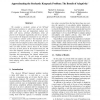Free Online Productivity Tools
i2Speak
i2Symbol
i2OCR
iTex2Img
iWeb2Print
iWeb2Shot
i2Type
iPdf2Split
iPdf2Merge
i2Bopomofo
i2Arabic
i2Style
i2Image
i2PDF
iLatex2Rtf
Sci2ools
135
Voted
FOCS
2004
IEEE
2004
IEEE
Approximating the Stochastic Knapsack Problem: The Benefit of Adaptivity
We consider a stochastic variant of the NP-hard 0/1 knapsack problem in which item values are deterministic and item sizes are independent random variables with known, arbitrary distributions. Items are placed in the knapsack sequentially, and the act of placing an item in the knapsack instantiates its size. Our goal is to compute a solution "policy" that maximizes the expected value of items placed in the knapsack, and we consider both non-adaptive policies (that designate a priori a fixed sequence of items to insert) and adaptive policies (that can make dynamic choices based on the instantiated sizes of items placed in the knapsack thus far). We show that adaptivity provides only a constant-factor improvement by demonstrating a greedy non-adaptive algorithm that approximates the optimal adaptive policy within a factor of 7. We also design an adaptive polynomial-time algorithm which approximates the optimal adaptive policy within a factor of 5 + , for any constant > 0.
FOCS 2004 | Knapsack | NP-hard 0/1 Knapsack | Optimal Adaptive Policy | Theoretical Computer Science |
Related Content
| Added | 20 Aug 2010 |
| Updated | 20 Aug 2010 |
| Type | Conference |
| Year | 2004 |
| Where | FOCS |
| Authors | Brian C. Dean, Michel X. Goemans, Jan Vondrák |
Comments (0)

